Food Is Medicine
An apple a day keeps the doctor away—right?
This well-worn adage dates back over 100 years, yet consumption of—and, often, access to—fresh, healthy foods like fruits and vegetables remains a challenge. Today, millions of American families experience food insecurity, and many more consume diets of low nutritional quality. Meanwhile, Type 2 diabetes and other nutrition-related health conditions are among the leading causes of death, illness, and healthcare spending in the country.
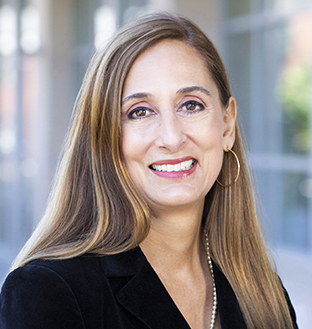
Recently, there has been renewed interest among scholars, clinicians, and policymakers in the role of nutrition to enhance health and prevent a range of chronic health conditions. Put another way, there’s a growing recognition of food as medicine. In September 2022, the White House hosted its first conference in 50 years focused on food, nutrition, and health. Concurrently, the Biden-Harris Administration released a National Strategy on Hunger, Nutrition, and Health, which outlines commitments for actions to reduce both food and nutrition insecurity and promote health equity.
According to UMass Amherst School of Public Health and Health Sciences (SPHHS) Dean Ana Maria Siega-Riz, a nutritional epidemiologist whose research focuses on maternal and child health, and a member of the 2015 federal Dietary Guidelines Advisory Committee, the COVID-19 pandemic both exacerbated and helped bring to the fore the problem of food insecurity. Combined with recent momentum in precision medicine—the study of individual genetic, environmental, and behavioral determinants of health—there is now a push to understand how the fields of food and nutrition can advance disease prevention.
UMass is well-positioned to lead in this moment. SPHHS is a nationally recognized leader in promoting social justice and resolving health inequities, and UMass has a record of excellence in community-engaged research across its schools and colleges. In fall 2022, UMass was an early adopter of the Okanagan Charter: An International Charter for Health Promoting Universities and Colleges, which calls for embedding health into all aspects of campus culture and leading health promotion activities and collaborations both locally and globally. In addition, UMass’s award-winning dining program is recognized for providing healthy, innovative, and culturally appropriate food to the student population, and for its involvement in nutrition education in the local community.
Moreover, faculty members spanning multiple UMass schools, colleges, and departments have extensive experience conducting research to improve health through nutrition.
“We’ve realized there’s an opportunity now to create synergies amongst all the UMass faculty and staff doing work around food as medicine, and have an even larger impact,” said Siega-Riz. To that end, she is collaborating with colleagues in the UMass departments of nutrition, health promotion and policy, and food science, and the Elaine Marieb College of Nursing, to establish a new center dedicated to studying food as medicine.
Prescriptions for Produce
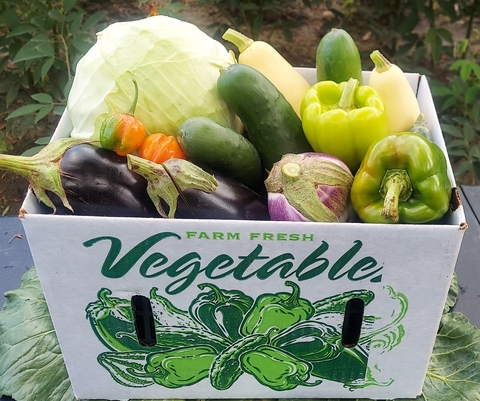 One strategy to promote healthy eating, which has gained steam in recent years, involves produce “prescriptions” for specific populations, such as groups of low-income individuals or those with diabetes or other diet-related health conditions. Currently, UMass researchers are partners in three separate produce prescription programs, each funded with a three-year, $500,000 grant from the Gus Schumacher Nutrition Incentive Program of the U.S. Department of Agriculture (USDA)’s National Institute of Food and Agriculture.
One strategy to promote healthy eating, which has gained steam in recent years, involves produce “prescriptions” for specific populations, such as groups of low-income individuals or those with diabetes or other diet-related health conditions. Currently, UMass researchers are partners in three separate produce prescription programs, each funded with a three-year, $500,000 grant from the Gus Schumacher Nutrition Incentive Program of the U.S. Department of Agriculture (USDA)’s National Institute of Food and Agriculture.
These programs involve partnerships between established community organizations, health clinics, and academic researchers, like the UMass faculty, who evaluate their efficacy in reaching specified goals, such as increasing procurement and consumption of fruits and vegetables, reducing food insecurity, and lowering healthcare use and costs. According to Siega-Riz—who piloted a prescription produce program in Charlottesville, Va., during her previous role as a faculty member at the University of Virginia—these programs have been the subject of some academic research in the past, but more consistent, rigorous study is needed to determine efficacy and best practices.
In Springfield, Mass., Lorraine Cordeiro, professor of nutrition and director of the Center for Research on Families at UMass, is principal investigator for the Springfield Prescription Produce Collaborative, a partnership with Baystate Health and its three community health centers, and the Wellspring Cooperative Corporation, which runs the Go Fresh Mobile Market. Participants in the program pick up about $40 to $80 worth of produce each month, along with recipes and nutritional information, from the Go Fresh Mobile Market site they visit.
“Food insecurity is persistent in low-income communities and presents a major barrier to the health and well-being of families and individuals in western Massachusetts,” said Cordeiro. “Produce prescription programs are a really innovative way to engage hospitals, clinics, and health centers with local farmers and other entities in the food supply chain to improve food access and promote healthy eating.”
In Hampshire County, Memnun Seven and Raeann LeBlanc in the Elaine Marieb College of Nursing are partnering with Hilltown Community Health Center and Healthy Hampshire—an initiative of the Collaborative for Educational Services—on a project that serves low-income and food insecure individuals with or at risk of developing chronic health conditions such as heart disease, cancer, and diabetes.
“The project aims to develop and explore the effect of a produce prescription program on healthy eating and the use of healthcare services while reducing food insecurity,” said Seven. “We’re evaluating the program’s efficacy for developing healthy diet, healthcare use, changes in health biomarkers—such as blood sugar and blood pressure, for example—and perception of levels of household food insecurity.”
As nurses, they bring to the project a distinctive set of knowledge and skills. “Nurses are in a unique position working with people not only in clinical settings, but also in the community to identify those at risk for food insecurity, advocate for access to fresh food and vegetables, and educate people on how to shop, cook, and eat healthy,” said LeBlanc. “As nurses, we provide whole person-centered care. We address the interplay of multilevel factors affecting access to and consumption of healthy food. This includes access to educational resources on how to adopt healthy choices and develop health eating to optimize the prevention of and/or management of chronic health conditions.”
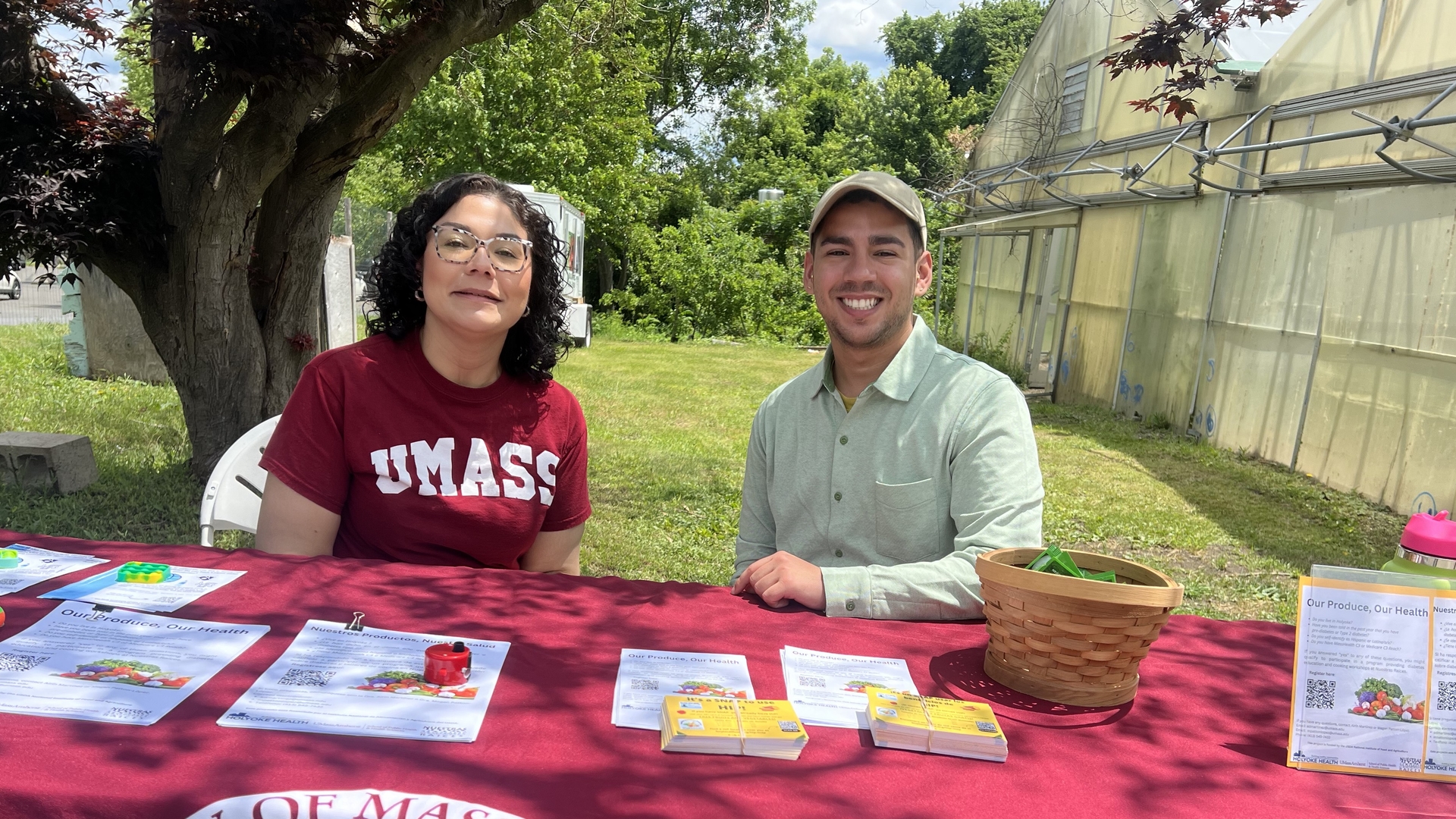
In Holyoke, Mass., Megan Patton-López, senior lecturer in nutrition, and Airín Martínez, assistant professor of health policy and management, are partnering with the local urban agriculture organization Nuestras Raíces ("Our Roots," in English) and the Holyoke Health Center on a produce prescription program. Participants are primarily Latinx pre-diabetic and diabetic patients from the Holyoke area.
“Some participants have shared their struggles to manage their blood glucose levels and their perceptions that they should seek more advanced treatment for type 2 diabetes. As we learned more about them, we realized that food insecurity may be a key barrier to managing their health condition,” said Patton-López. “Healthy food is essential. Ideally, individuals can access healthy food appropriate for their health conditions and increase fruit and vegetable intake while also reduce glycated hemoglobin (A1C).”
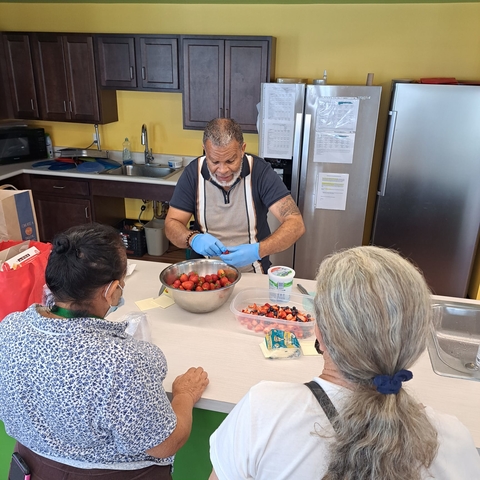
Over 12 weeks, program participants attend six educational sessions led by Darwin Cruz, a nurse with Nuestras Raíces, on topics including managing their disease and the benefits of exercise and proper nutrition. Every session also includes a cooking demonstration. After each session, members of the intervention groups bring home a box of fresh, culturally appropriate produce—either for themselves or their entire household, depending on the group—while members of the control group participate in the educational sessions but do not receive produce “prescription” boxes.
“We're evaluating whether each of these conditions addresses food insecurity at the household level, understanding that food-insecure families typically allocate food in certain ways to individual members. For example, they may ensure children get enough to eat first,” explained Martínez. The researchers are also evaluating changes in participants’ biomarkers—including hemoglobin A1C (average blood sugar over the past three months), body mass index (BMI), blood pressure, fasting glucose, and lipids—and surveying participants about the quality of their diet, access to healthy foods, and food insecurity.
The researchers report data every three months to the USDA, which aggregates data from similar produce prescriptions programs across the country to inform their policy advocacy. These findings may be used to inform the next federal farm bill, or to advocate for Medicaid and Medicare reimbursement for produce prescription programs, beyond what is allowed in the Massachusetts Medicaid/Medicare 1115 waiver.
Patton-López and Martínez have observed certain barriers to consistent participation in the program, including constraints on time, transportation, and mobility. They are making real-time recommendations to Nuestras Raíces to try to mitigate these barriers.
The participants have also reported that the community fostered by the program is helpful as they work to change their eating behaviors, said Martínez. “Making this kind of change is not easy. Being part of a group going through the program, they’re finding a support system.”
Meeting Consumers Where They're At
Undoubtedly, we’d all be healthier eating more fruits and vegetables and less processed foods. Yet, “Nutritionists have been telling us to eat healthy foods for years and years, and it hasn’t changed people’s behavior,” said D. Julian McClements, distinguished professor in the UMass Amherst Department of Food Science. “We have to meet people where they’re at. We’re evolutionarily drawn to foods high in fat, salt, and sugar. We have to think about how to make these processed foods that people seek out healthier, while not sacrificing taste, convenience, or affordability.”
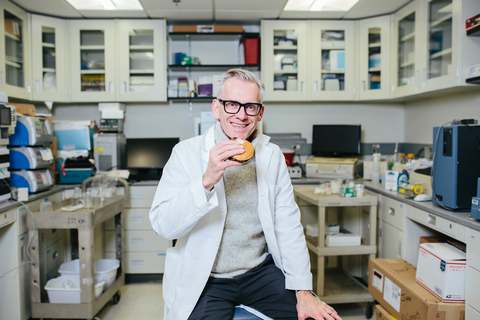
McClements—who, along with two of his food science colleagues, is consistently ranked among the world’s most highly cited researchers by Clarivate Analytics—conducts research on foods that are better not just for human health, but for the planet. Over the past five years, the department’s focus has shifted heavily toward research on plant-based analogs for meat, seafood, eggs, and dairy products. While some plant-based foods on the market today are less beneficial to human health than the animal products they’re replacing—McClements pointed to vegan cheeses that are high in saturated fat and sugar but lacking in the protein and calcium found in dairy cheese—the UMass food scientists are working to make them healthier.
“We’re trying to use knowledge from medicine and nutrition science to redesign foods to be healthier. We’re reducing fat, salt, and sugar, and fortifying foods with Omega-3 fatty acids, dietary fiber, and other micronutrients like vitamins D and B12, calcium, and iron, which might be lacking in a plant-based diet,” said McClements. “We have to understand not only how to assemble ingredients from nature into these highly complex materials we call foods, but also understand how they get disassembled in the body, distributed to all the body’s organs, and ultimately how they fuel the body.”
For example, McClements and colleagues developed an egg product made from pea or potato protein that looks and tastes similar to chicken eggs. They fortified it with Omega-3 fatty acids and lutein, a type of carotenoid that promotes eye health. “This could be sold as liquid ‘egg’ in a carton, or as pre-cooked patties. It could help prevent macular degeneration—a cause of blindness—in the elderly,” said McClements.
Though processed foods face a backlash from some consumers, McClements believes scientific and technological advances in food are positive overall. In fact, he said, they are necessary to address mounting challenges, including feeding a growing global population, climate change and extreme weather, and public health challenges associated with diets heavy in unhealthy processed foods.
“We shouldn’t be scared of science,” he said. “I think we really need it if we're going to solve these big problems.”
Added Siega-Riz, "In order to improve population health, we must consider the accessibility of nutritious food, as well as the social, economic, and environmental contexts that determine our dietary behaviors. The UMass 'food is medicine initiative' seeks to address all these interrelated dimensions."
This story was originally published by University Relations.

